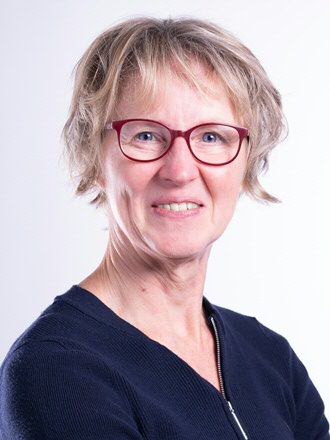Sandra Tillema | Faces of FEB
The Faculty of Economics and Business is a faculty with a great diversity of people who all have an impact, big or small, on science and society. But who are these people? Within ‘Faces of FEB’ we connect with different students, staff members and researchers of the faculty and give a little peek into their world. This month: Sandra Tillema, the academic director of Career Services and Corporate Relations at FEB.

1. Can you tell us a bit about yourself?
My name is Sandra Tillema, and I have already been connected to FEB for many years. I studied Economics (specialising in Business Economics / Finance) at this faculty, and I also did my PhD here. Currently, I am an associate professor in the department of Accounting and Auditing. In addition to doing research and teaching courses, I very much like being involved in educational quality and management. For many years, I was programme coordinator of the Management Accounting and Control profile of the MScBA, and programme director of the MSc Accountancy & Controlling. Recently, my management responsibilities have shifted to the Career Services and Corporate Relations department.In my spare time, I like being outdoors and enjoying nature. Some find it the weirdest hobby ever, but I like bird watching. Today, I noticed from my office window that the oystercatchers have returned from their winter destination to the Pavilion rooftop. Spring season is coming! Also traveling, hiking and gardening are on my list of favorite activities. And I like reading novels, particularly novels from which I can learn a bit more about the history of other countries.
2. You are the academic director of Career Services and Corporate Relations, what does this function precisely entail?
In short, I am responsible for the teaching offered by Career Services. This includes the various types of skills training that are part of many courses and educational programmes (e.g. working in teams, giving feedback, and dealing with diversity & inclusion). It also includes the (Junior) Business Research and Consulting course and the learning communities, for instance, in programming, blockchain and wicked problems. Currently, many bachelor and master programmes are evaluating the types of skills training offered to students, and adjusting them to the current demands of employers. So these are interesting times for us.
3. Why did you apply for this job?
As I indicated, I like being involved in educational quality. Ultimately, educational quality is about preparing students for a career, either in academia or in practice. Being successful after graduation requires not only knowledge, but also professional and other skills. As a programme director, I always felt that we could do more on making students aware of the skills they already have and helping them to further develop their skills. Achieving this is a core element of my new role. Apart from that, my new role involves cooperating with colleagues throughout the faculty, which gives me a lot of energy.4. What is your advice for students who want to start up their career?
Be more aware of the skills that you have developed while going through your bachelor’s and master’s programmes. I always find it amazing to see how, in the few years they stay with us, students develop from pupils who just left secondary school into young professionals and responsible citizens. The assignments you have to make in courses may not always be straightforward or inspiring, and some of your teammates may not be your best friends, but they all help you to develop the skills that you need in practice.| Last modified: | 21 February 2023 3.06 p.m. |
